
13.01.2023
Dostoevsky later called his political views of the Petrashevites “theoretical socialism” in the spirit of the Fourier system.
During Dostoevsky’s lifetime, two directions of social and philosophical thought – Slavophilism and Westernism — were opposed in the cultural strata of society regarding the alternative opposition of Russia and the West, the essence of which is approximately as follows: adherents of the first argued that the future of Russia was in nationality, Orthodoxy and autocracy, adherents of the second believed that Russians should take an example from Europeans in everything. Both of them reflected on the historical fate of Russia. A narrow circle of employees of the magazines “Time” and “Epoch”, together with Dostoevsky, adhered to their own independent position, expressed by “pochvennichestvo”. The writer was and remained a Russian man, inextricably linked with the people, but at the same time did not deny the achievements of the culture and civilization of the West. Over time, Dostoevsky’s views developed: the former member of the circle of Christian Utopian socialists turned into a religious conservative, and during his third stay abroad finally became a convinced monarchist.
After his first trip to Europe in 1862, “Dostoevsky became an opponent of the spread of universal, pan-European progressivism in Russia”, speaking in the article “Winter notes on summer impressions” (1863) with sharp criticism of Western European bourgeois society, which replaced freedom with a “million”. Dostoevsky filled Herzen’s concept of “Russian socialism” with Christian content. Dostoevsky denied the division of society into classes and class struggle, believing that atheistic socialism cannot replace bourgeoisism, since it does not fundamentally differ from it. In the magazines “Time”, “Epoch” and in the “Diary of a writer” Dostoevsky gave the opportunity to freely express opposing opinions. The writer considered himself more liberal compared to Russian liberals:
“In short, our liberals, instead of becoming freer, have bound themselves with liberalism like ropes, and therefore, taking advantage of this curious case, I will keep silent about the details of my liberalism. But in general, I will say that I consider myself the most liberal of all, at least for the one reason that I do not want to calm down at all. — Dostoevsky F. M. “Diary of a writer”. 1876. January. Chapter 1. Instead of the preface. About the big and little bears, about the prayer of the great Goethe and generally about bad habits “
The political views of F. M. Dostoevsky should be considered within the framework of the theory of official nationality (Orthodoxy, autocracy and nationality). Russian Russian political scientist L. V. Polyakov ranks F. M. Dostoevsky among the outstanding representatives of Russian conservatism, and historian A.V. Repnikov attributes F. M. Dostoevsky’s pochvennichestvo to Slavophilism and Russian conservatism. The most detailed study of soil science is in the monographs of the Polish political scientist Andrzej de Lazari and the Canadian historian Wayne Dowler.

Despite the confrontation with Slavophilism, the writer himself considered himself to be a Slavophile who advocated the unification of all Slavs (pan-Slavism):
” “I am in many respects of purely Slavophile beliefs, although perhaps not quite a Slavophile.” “And finally, for the third Slavophilism, in addition to this union of Slavs under Russia, means and embodies the spiritual union of all believers in the fact that our great Russia, at the head of the united Slavs he will tell the whole world, all European humanity and its civilization his new, healthy and still unheard of word by the world. This word will be said for the good and truly already in the union of all mankind with a new, fraternal, worldwide union, the beginnings of which lie in the genius of the Slavs, and mainly in the spirit of the great Russian people, who have suffered for so long, doomed to silence for so many centuries, but always contained great forces for the future clarification and resolution of many bitter and the most fatal misunderstandings of Western European civilization. It is to this department of the convinced and believers that I also belong” — Dostoevsky F. M. “Diary of a writer”. 1877. July-August. Chapter 2. Confessions of a Slavophile “
On the part of F. M. Dostoevsky’s opponents, his political views were interpreted at various times as retrograde, reactionary, nationalism, chauvinism or as anachronisms of anti-Semitism, rabid black Hundreds. F. M. Dostoevsky became known as a retrograde and reactionary after the publication of the novel “Demons”, when part of the educated public supported the views of nihilists, narodniks and revolutionary democrats. This opinion was supported by the work of N. K. Mikhailovsky “Cruel Talent”, the epigraphs of which were quotes from the works of F. M. Dostoevsky, testifying to the misinterpretation of their ideological orientation.




